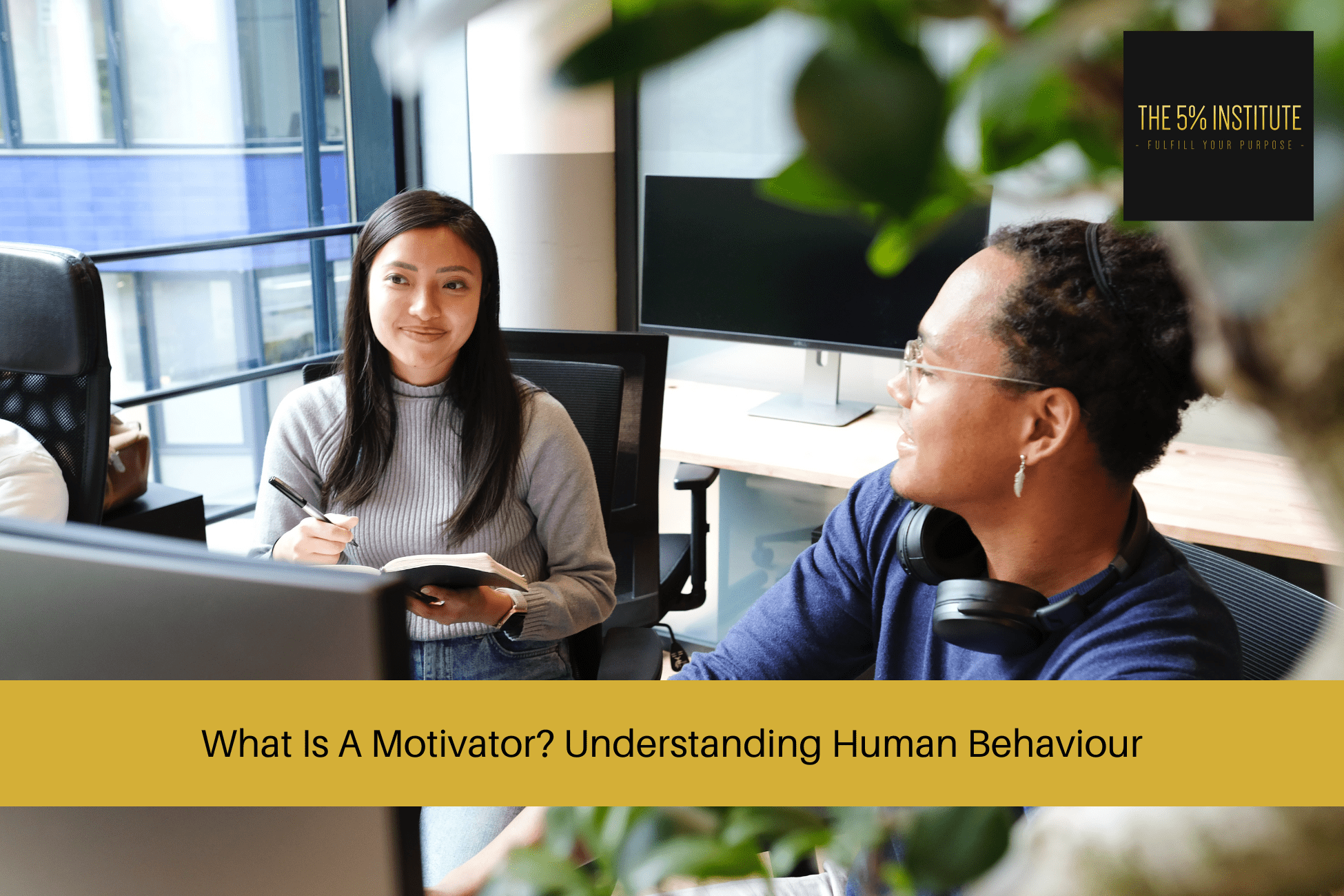
What Is A Motivator? Understanding Human Behaviour
What is a motivator?
And why is learning about motivation, and internal drivers important to you, or your business?
In this article, we’ll unpack everything motivation – from where it comes from, the various types of motivators, and how you can use it to your full advantage in an ethical way.
What Is A Motivator? Introduction
Motivation is the driving force that compels individuals to take action, achieve goals, and pursue success in various aspects of life.
It is the inner fire that propels us forward, pushing us to overcome challenges and embrace opportunities.
Understanding the concept of motivation and how to harness it is crucial for personal growth, professional success, and overall well-being.
Understanding Motivation
The Concept of Motivation
Motivation is the process that initiates, guides, and sustains goal-oriented behaviours.
It is influenced by both internal and external factors, and it varies from person to person.
Some individuals may be naturally more self-motivated, while others may require external incentives to perform at their best.
The Importance of Motivation
Motivation plays a pivotal role in shaping human behaviour and achievements.
It is the driving force behind creativity, innovation, and progress.
Whether it’s in the workplace, academic settings, or personal endeavours, motivation is the catalyst for growth and success.
Types of Motivators
Intrinsic Motivation
Intrinsic motivation arises from within a person and is driven by internal rewards.
It is about finding personal satisfaction, enjoyment, or a sense of purpose in the task itself, rather than seeking external rewards or recognition.
Extrinsic Motivation
Extrinsic motivation comes from external factors like rewards, recognition, or punishments.
While it can be effective in the short term, sustained reliance on extrinsic rewards may diminish intrinsic motivation.
Achievement Motivation
Achievement motivation is the inner drive to excel and accomplish challenging tasks.
Individuals with high achievement motivation often set ambitious goals and take calculated risks to achieve them.
The Psychology Behind Motivation
Maslow’s Hierarchy of Needs
Maslow’s Hierarchy of Needs is a psychological theory that outlines five levels of human needs, starting from basic physiological needs to self-actualization.
The theory suggests that as lower-level needs are met, higher-level needs become the motivators.
Self-Determination Theory
The Self-Determination Theory emphasizes the role of autonomy, competence, and relatedness in driving motivation.
When individuals feel in control, competent, and connected to others, they are more likely to be motivated.
Goal Setting Theory
The Goal Setting Theory suggests that setting clear and challenging goals can motivate individuals to work harder and perform better.
Well-defined goals provide direction and a sense of purpose.
Expectancy Theory
The Expectancy Theory posits that people are motivated to act based on their belief that their efforts will lead to desired outcomes.
It involves the relationship between effort, performance, and rewards.
Factors Affecting Motivation
Environment
The surrounding environment can significantly impact motivation.
A positive and supportive atmosphere can foster motivation, while a negative or toxic environment may stifle it.
Personal Beliefs and Values
Individual beliefs, values, and attitudes shape their motivations.
Aligning personal values with goals can enhance motivation.
Rewards and Recognition
Offering appropriate rewards and recognition can boost motivation.
However, understanding individual preferences is crucial, as not all rewards may be equally effective.
Emotional State
Emotional states such as excitement, enthusiasm, or stress can influence motivation levels.
Managing emotions is vital for sustained motivation.
Past Experiences
Past successes and failures can influence current motivation.
Learning from failures and celebrating successes can maintain motivation.
Harnessing Your Motivation
Setting Clear Goals
Clear and specific goals provide a sense of direction and purpose.
Break down larger goals into smaller, achievable steps.
Building Self-Discipline
Self-discipline is essential for staying motivated, especially in the face of challenges or distractions.
Finding Purpose and Passion
Connecting with one’s passions and understanding the purpose behind actions can ignite long-lasting motivation.
Overcoming Procrastination
Procrastination is a common motivation killer.
Identifying and addressing the reasons for procrastination can boost productivity.
Seeking Support and Accountability
Having a support system and being accountable to others can enhance motivation and commitment.
Motivation at Work
The Role of Leadership
Effective leaders can inspire and motivate their teams through positive reinforcement and empowering communication.
Fostering a Motivating Work Environment
Creating a supportive and inclusive work culture can increase employee motivation and engagement.
Employee Engagement and Productivity
Engaged employees are more motivated and productive, contributing to organizational success.
Motivation in Education
Encouraging autonomy and curiosity in students can foster intrinsic motivation for learning.
Encouraging Curiosity and Exploration
Creating an environment that encourages exploration and questioning can spark motivation in students.
The Teacher’s Role as a Motivator
Teachers can play a significant role in motivating students through effective teaching methods and mentorship.
The Power of Self-Motivation
Cultivating a Growth Mindset
A growth mindset encourages the belief that abilities and intelligence can be developed through effort and learning.
Overcoming Obstacles
Resilience and determination are vital for overcoming obstacles and maintaining motivation.
Maintaining Motivation in the Long Run
Sustaining motivation requires periodic evaluation, adaptation, and reinforcement of goals.
Motivation and Health
The Link Between Motivation and Well-being
Motivated individuals are more likely to adopt healthy behaviours and prioritize self-care.
Exercise and Physical Activity
Staying motivated to exercise regularly can lead to improved physical and mental health.
Motivation for Healthy Habits
Motivation can help individuals form and maintain healthy habits, such as a balanced diet and stress management.
The Dark Side of Motivation
Obsession and Burnout
Overly intense motivation can lead to burnout and negative consequences on health and well-being.
Dealing with Unhealthy Motivation
Recognizing and addressing unhealthy motivations is crucial for maintaining balance and avoiding harmful behaviours.
Cultivating Motivation in Others
Motivating Your Team or Group
Effective strategies to motivate and inspire groups towards shared goals.
Supporting Friends and Family
Encouraging and supporting loved ones in their pursuits can fuel their motivation.
Conclusion
Motivation is the engine that drives personal growth and achievement.
Understanding the different types of motivators and the psychology behind motivation empowers individuals to cultivate their inner drive and reach their full potential.
By setting clear goals, fostering self-discipline, and embracing passion, anyone can unlock the power of motivation and create a path towards success and fulfilment.
What Is A Motivator FAQs
1. What are some everyday motivators?
Everyday motivators can include simple achievements, positive feedback, or progress towards personal goals.
2. Can motivation be learned?
Yes, motivation can be learned and developed through self-awareness and intentional efforts.
3. How do setbacks affect motivation?
Setbacks can dampen motivation, but they can also be opportunities for growth and resilience.
4. What role does passion play in motivation?
Passion fuels intrinsic motivation and sustains commitment to long-term goals.
5. How can one stay motivated during tough times?
During tough times, staying connected to purpose, seeking support, and maintaining self-belief can help sustain motivation.
Want To Close Sales Easier?
Are you committed to closing sales a lot easier, and consistently?
If so, you should check out our self-paced and affordable online sales training program; The 5% Sales Blueprint.
It’ll give you everything you need to close sales consistently.
To learn more, simply click on the link below for more information.
Our Online Sales Training Program – The 5% Sales Blueprint.



